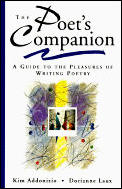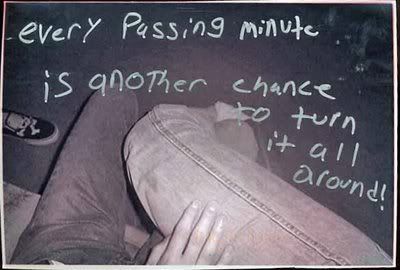Practicing poetry
 I bought this book a few months ago and yesterday, I finally picked it up and started reading it. I'm about four chapters into the first section, which deals mainly with how to generate ideas for poems. I know that it probably seems amateurish to be reading a sort of "how-to" guide to poetry but give me a break, I am an amateur.
I bought this book a few months ago and yesterday, I finally picked it up and started reading it. I'm about four chapters into the first section, which deals mainly with how to generate ideas for poems. I know that it probably seems amateurish to be reading a sort of "how-to" guide to poetry but give me a break, I am an amateur.The extent of my formal training with poetry is limited to what I learned in high school. We learned about forms and meter and rhyme and a lot of other things that I never really paid attention to. We learned how to write haikus and sonnets and we staged poetry readings which I always dreaded. I didn't like poetry then, I didn't understand most of it and it bored me. I never, ever thought that I would attempt to write it on my own one day.
I first started writing poetry on a whim. I had no idea what I was doing. I was one of those people who thought sites like poetry.com were totally legit and that poetry always had to rhyme. The poems I wrote reflected my inexperience but I kept going, stumbling through it blindly. In the meantime, I read a lot of different poets, trying to determine what I did and didn't like. In a way, this is how I learned to write poetry, or at least write it a little better.
Last week, I put up a post for Poetry Thursday that generated an interesting discussion in the comments. Basically, the question I was asking was how do you know if you're any good at this poetry thing? The lovely Rebecca Loudon told me that there really is no way to know for sure, that you just have to keep writing and make sure you're in love with what you're doing.
It's not hard to decide what you do or don't like when it comes to someone else's work. My rule for determining whether poetry is any good is if I want to keep reading after the first few lines. I need something, some spark in those first few lines to pull me into the poem. If you've read this blog before, you know that I'm a big Sharon Olds fan. I love her poetry because so much of it is concerned with the human aspect of herself. She writes about the body, the self, the family, in raw but precise terms. I read Louise Gluck because she uses simple language to convey complex thoughts and images. Her poems read like a conversation, they flow so easily. I read Kim Addonizio because she writes with such force that it leaps out from the page. There's so much passion and energy in what she writes.
When it comes to my own work, I tend to have more of a blind spot. I write poetry because it's something I enjoy. It seems to me to be one of the purest forms of self-expression and I love to do it. I have no training for it, no one's asking me to do it. I'm sure there are probably some people who wish I would stop. I don't know if what I write is any good or if I'll ever get good at it but I plan to keep trying.
I tend to think of everything I write as practice. So the question is, how do you know when you're not just practicing anymore? Is it all just practice in the long run? Is there a point when you reach a certain level of refinement or is there always room for improvement? How do you know when you've got it?


11 Comments:
I'm by no means a poet, but I did take a class years ago on writing poetry that used this same book. Just seeing the picture on your post brought back a memory or two. To be honest, I can't remember much about the book now, but it did seem to help me generate some ideas and steer me toward some stylistic techniques. It must have been good enough that I kept it, because it's still on my shelf.
Good luck!
I had written this very long, involved response which was not saved. It was probably too long.
Here is the short version:
It's always practice, no matter how many years you've been at it.
William Stafford used to say, "We need our bad poems" and I have found that to be true. I learn from my bad poems.
Amateur means you do something for the love of the thing instead of money. So here's to you and a lot more poets being amateurs.
Money is something I only vaguely associate with writing. Mainly, I do this because I enjoy it and so better writers will have someone to point to and laugh. ;)
By the way, anyone who comments here should click on Matt's name at the top and check out his blog. He is an awesome writer and his taste in books/authors is impeccable.
Lynn, you're back! (Does a little dance) I know, she is awesome. It was so nice of her to take the time to give me advice.
I actually own that book as well as several others on writing poetry. I don't think that owning books like this is "amateurish" at all.
In fact, I probably should use them more often.
Good questions that you raise. I've also held a deep suspicion that I'm a poetaster. Most days, I confirm this suspicion.
Love your blog, by the way.
SPANDEX!
HAHAHAAAA!
You know I'd be shot and killed.
Poet's Companion is a terrific book.
As for practice, it's my goal. Period. Making practice your goal is the key to mastery. It's one of those counterintuitive principles.
I guess you know you've got it when you're dead.
Onward and upward!
Okay, okay, no spandex. Would you wear the cape though? I mean, you are kind of a poetry superhero, rescuing us little wayward wannabes whenever we need it. (Whoa, too much alliteration. I guess that book is teaching me something.)
I'm not a hero. I garden in my nightgown for crapsake. I wear a nightgown. I'm 150 years old. And cranky.
But yes, I think the cape would be wonderful.
Gardening in your nightgown be damned, you still rock.
I'm late responding to this post. I just want to say that the Writing Poems book is quite good and offers a lot of helpful suggestions in generating poems when one is stumped or hunting for a subject and not simply writing what Stafford calls the Australian Crawl, that is, writing quickly without any preconceived notions of what might occur during the composing process. The Wallace/Boisseau text Writing Poems offers more contemporary poems and poems from the tradition as models, but the writing tips are not as helpful.
Post a Comment
<< Home